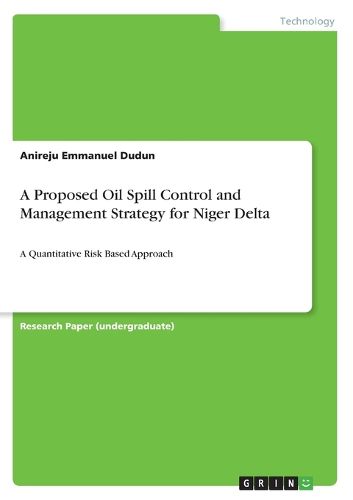Readings Newsletter
Become a Readings Member to make your shopping experience even easier.
Sign in or sign up for free!
You’re not far away from qualifying for FREE standard shipping within Australia
You’ve qualified for FREE standard shipping within Australia
The cart is loading…






Research Paper (undergraduate) from the year 2012 in the subject Environmental Sciences, course: Petroleum Engineering, language: English, abstract: Oil spill is one of the most dangerous side effects of crude oil exploration and production in the Niger Delta area of Nigeria. Its resultant effect on the environment, surface body of water, ground water, and biodiversity signifies that if appropriate measures of management are not put in place, the Niger delta's coastal habitat and inland habitat will no longer be habitat able. This paper examines the prevailing policies and procedure for the oil spill contingency planning in the Nigeria and identifies problems associated with the response action to oil spill incidents in the Niger Delta region. It also proffers solution to the problems, drawing on the wealth of experience gained from the oil spill preparedness and response put in place by some government agencies and operators across the globe. Based on this, the paper proposes a Quantitative risk based approach for the oil spill preparedness and response in the Niger Delta. This approach involves the quantification of risk as result of the probability of an event occurring and the impact potential of the event. Hence hazards and risks can be pre-determined and effective strategies could be developed to mitigate the impacts of potential oil spills.
$9.00 standard shipping within Australia
FREE standard shipping within Australia for orders over $100.00
Express & International shipping calculated at checkout
Research Paper (undergraduate) from the year 2012 in the subject Environmental Sciences, course: Petroleum Engineering, language: English, abstract: Oil spill is one of the most dangerous side effects of crude oil exploration and production in the Niger Delta area of Nigeria. Its resultant effect on the environment, surface body of water, ground water, and biodiversity signifies that if appropriate measures of management are not put in place, the Niger delta's coastal habitat and inland habitat will no longer be habitat able. This paper examines the prevailing policies and procedure for the oil spill contingency planning in the Nigeria and identifies problems associated with the response action to oil spill incidents in the Niger Delta region. It also proffers solution to the problems, drawing on the wealth of experience gained from the oil spill preparedness and response put in place by some government agencies and operators across the globe. Based on this, the paper proposes a Quantitative risk based approach for the oil spill preparedness and response in the Niger Delta. This approach involves the quantification of risk as result of the probability of an event occurring and the impact potential of the event. Hence hazards and risks can be pre-determined and effective strategies could be developed to mitigate the impacts of potential oil spills.